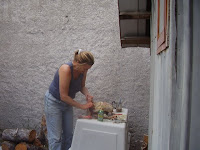

Keeping myself busy...Above...a before and after. The after includes my dried flowers and home-made candle.
I've taken to stealing roses, just one or two at a time, as a late-in-life criminal venture. With a rose bush every 20 feet, on every street in Futa, and some bushes taller than houses poking out over rickety fences, I find myself walking up or down a street in my big old corduroy jacket with a thick pair of garden scissors in the pocket. And by the time I end up back at our little cabin, I have another stash of stolen roses to hang and dry. Sometimes I detour from my m.o., and clip pieces of lavender, and when the summer wanes, flowering mint and catnip. I tie them up with pieces of horsehair and hand them above the wood stove and just let them slowly dried and grow slightly brittle. I went on such a criminal enterprise today after spying a yard full of magenta and white rose bushes. My conscience got me this time, and I knocked on the door of the little yellow, wooden house. The man of the house was fine with me having some roses, but not with letting me free to cut them, so he grabbed a kitchen knife and walked across the yard with me to clip some prolific bunches. White, deep red, and a fuchsia color. Back home, my criminal urges not satisfied, I snuck into the back yard and cut copious amounts of anise, oregano and lemon balm from an abandoned garden, tying them up and hanging them on nails under the steps.
Of the things I've gathered to dry, the lilacs surprised me the most...they held together and lost not a bud or flower, and kept their lavender and white colors. Real lavender dries to a lovely grey-green, while the hop vine and catnip tend to curly and grow too bitter.
Nono and Ismael were working in town on their new addition to their house which is already rented for season. As they were clearing out the backyard and old shed, Ismael hauled out an old wooden box they decided to use for firewood. I spied it and told Nono, Cuanto Vale? She tilted her head back and laughed. I said no really, I could make something from it, a bench, or coffee table. She waved it at me and I loaded the chicken-shit, ash-encrusted thing into the bed of the truck and brought it home. Greg has known me for eighteen+ years, and after stopping for dead birds, cow skulls, horse hair and rocks along side roads in three countries, he didn't flinch when I asked him to help me carry the rickety mess to the backyard where I promised I would transform it into "something".
I pounded it apart, brushed off the big chunks, sat with a hatchet head and bent nails and started to put the box bench back together. Chickens pecked around in the mash of ash and new grass, and the clouds rolled in. I dragged the thing under the little back porch and made supper, all the time thinking about what the jumble of old boards would become.
The next day, I went to the hardware store and bought one sheet of sandpaper and a can of clear varnish. After a half-hour of digging through bags and boxes, I located a bag of upholstery tacks, and a pair of kitchen scissors to cut up my pounded copper sheets. Dishes rested in the sink, and clothes re-dried on the clothesline as I walked around and around my blank slate of a box bench. Off came the bottom planks, revealing legs. I sanded. Then I carved and gouged Mapuche symbols into the front and top. Oh...now the adrenaline is running high! I grabbed my aged copper panel, and clipped some strips and squares, and began to attach them to the bench with upholstery tacks. Then in a frenzy I found my child's tray of water color paints and mixed up a little tray of blue-green, and began to wash it into the carved Mapuche symbols. Dot up the excess and step back. Perfect. Out comes the varnish and in a manic flash, I let the old porous wood soak up a half a pint. While it's drying, I dig my skeins of horsehair out from under the couch and tape the ends, comb it out, and start braiding it for handles on the ends of the table.
Now, a day later, still without the handles, it is essentially done. I rubbed it with a little aromatic wax I made from old candles and lavender oil and a little floor wax mixed in. I LIKE IT. Looks to me like something off an old pirate ship from the 1700's. I set some dried flowers in a jar, and a homemade candle in an old stove top part on top of it, and it's perfect!





























